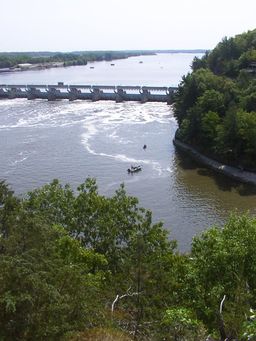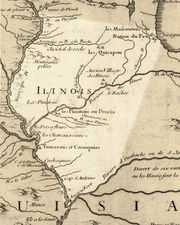Illinois River
| Illinois River | |
| River | |
 The Illinois River, as seen from Starved Rock State Park. Notice the dam in the left center portion of the picture.
|
|
| Country | United States |
|---|---|
| State | Illinois |
| Source | Confluence of the Kankakee and Des Plaines Rivers |
| - location | Grundy County, Illinois, United States |
| - elevation | 505 ft (154 m) |
| - coordinates | |
| Mouth | Mississippi River |
| - location | Grafton, Illinois, United States |
| - elevation | 417 ft (127 m) |
| - coordinates | |
| Length | 273 mi (439 km) |
| Basin | 28,070 sq mi (72,701 km²) |
| Discharge | |
| - average | 23,200 cu ft/s (657 m3/s) |
 Map of the Illinois River watershed
|
|
| [1][2] | |
The Illinois River is a principal tributary of the Mississippi River, approximately 273 miles (439 km) long, in the U.S. state of Illinois.[3] The river drains a large section of central Illinois, with a drainage basin of 28,070 square miles (72,701 km2).[2] The river was important among Native Americans and early French traders as the principal water route connecting the Great Lakes with the Mississippi. The French colonial settlements along the river formed the heart of the area known as the Illinois Country. After the construction of the Illinois and Michigan Canal and the Hennepin Canal in the 19th century, the river's role as link between Lake Michigan and the Mississippi was extended into the era of modern industrial shipping.
Contents |
Hydrography
The Illinois River is formed by the confluence of the Kankakee and Des Plaines rivers in eastern Grundy County, approximately 10 miles (16 km) southwest of Joliet. It flows west across northern Illinois, passing Morris and Ottawa, where it is joined by the Mazon River and Fox River. At LaSalle, it is joined by the Vermilion River, then flows west past Peru, and Spring Valley. In southeastern Bureau County it turns south at an area known as the "Great Bend," flowing southwest across western Illinois, past Lacon and downtown Peoria, the chief city on the river.
South of Peoria it is joined by the Mackinaw River and then passes through the Chautauqua National Wildlife Refuge. Opposite Havana, it is joined by the Spoon River, and across from Browning, it is joined by the Sangamon River. The La Moine River flows into it approximately 5 miles (8 km) southwest of Beardstown.
Near its confluence with the La Moine River, it turns south, flowing roughly parallel with the Mississippi across southwestern Illinois. It is joined by Macoupin Creek on the border between Greene and Jersey counties, approximately 15 miles (24 km) upstream from its confluence with the Mississippi.
For the last 20 miles (32 km) of its course, it is separated from the Mississippi by only 5 miles (8 km), a peninsula that comprises Calhoun County. It joins the Mississippi near Grafton, approximately 25 miles (40 km) northwest of downtown St. Louis and about 20 miles (32 km) upstream from the confluence of the Missouri and the Mississippi.
Geology
South of Hennepin, the Illinois River is following the ancient channel of the Mississippi River. The Illinoian Stage, about 300,000 to 132,000 years ago, blocked the Mississippi near Rock Island, diverting it into its present channel. After the glacier melted, the Illinois River flowed into the ancient channel. The Hennepin Canal roughly follows the ancient channel of the Mississippi upstream of Rock Island.
The modern channel of the Illinois River was shaped in a matter of days by the Kankakee Torrent. During the melting of the Wisconsin Glacier about 10,000 years ago, a lake formed in present-day Indiana, comparable to one of the modern Great Lakes. The lake formed behind the terminal moraine of a substage of that glacier. Melting ice to the north eventually raised the level of the lake so that it overtopped the moraine. The dam burst, and the entire volume of the lake was released in a very short time, perhaps a few days.
Because of the manner of its formation, the Illinois River runs through a deep canyon with many rock formations. It has an "underutilised channel," one far larger than would be needed to contain any conceivable flow in modern times.
.jpg) Late October 2009 (before the flood). |
.jpg) Early November 2009 (during the flood). |
History

The Illinois River valley was one of the strongholds of the Illinois Confederation of Native Americans. The French first met the natives here in 1673. The first European settlement in the state of Illinois was the Jesuit mission founded in 1675 by Father Jacques Marquette on the banks of the Illinois at Starved Rock. In 1680, René-Robert Cavelier, Sieur de La Salle built the first fort in Illinois, Ft. St. Louis, at Starved Rock. Later it was relocated to the present site of Creve Coeur, near Peoria, where the Jesuits relocated.
Modern use
_tow_downbound.jpg)
From 1905 to 1915, more freshwater fish were harvested from the Illinois than from any other river in the United States except for the Columbia. The river was once a major source of mussels for the shell button industry. Overfishing, habitat loss from heavy siltation and pollution have eliminated most commercial fishing except for a small mussel harvest to provide shells to seed pearl oysters overseas. It is commercially fished downstream of the Rt. 89 bridge at Spring Valley. The river is still an important sports fishing resource with a world-class sauger fishery.
The Illinois forms part of a modern waterway that connects the Great Lakes at Chicago to the Mississippi River. The waterway was originally established by the building of the Illinois and Michigan Canal that connected the Illinois River to the Chicago River. When the Sanitary District of Chicago later reversed the flow of the Chicago River, the pollution and sewage of the city of Chicago flowed down into the Illinois River. The Illinois and Michigan Canal has since been replaced by the Illinois Waterway, including the Chicago Sanitary and Ship Canal. River traffic and flood control is managed by eight locks and dams operated by the Army Corps of Engineers. Currently all locks and dams are closed to visitors for security reason except the Starved Rock Visitor Center, which offers an excellent interpretation of the entire system. The waterway is heavily used by barges' transporting bulk goods such as grain and oil. It is used in the summer and early fall by tourists in pleasure boats cruising the Great Loop. The Illinois River is an important part of the Great Loop, the circumnavigation of Eastern North America by water.
The City of Peoria is developing a long-term plan to reduce combined sewer overflows to the Illinois River, as required by the U.S. Environmental Protection Agency and the Illinois Environmental Protection Agency. During dry weather, sewage flows safely through the city's sewers to the Greater Peoria Sanitation District wastewater treatment plant. However, about 28 times a year, melting snow or rainwater can overwhelm the sewers, causing untreated sewage to overflow into the Illinois River. Peoria was required to examine the sewer overflows and prepare a long-term control plan to meet Clean Water Act requirements and protect the Illinois River. The city had to submit its plan by December 2008 to U.S. EPA and Illinois EPA.[4]
Cities and towns

- Bath
- Beardstown
- Browning
- Chillicothe
- Chicago
- Creve Coeur
- East Peoria
- Florence
- Hardin
- Havana
- Hennepin
- Henry
- Kampsville
- Kingston Mines
- LaSalle
- Lacon
- Liverpool
- Marseilles
- Meredosia
- Morris
- Naples
- Naplate
- North Utica
- Oglesby
- Ottawa
- Pekin
- Peoria
- Peoria Heights
- Peru
- Rome
- Seneca
- Spring Bay
- Spring Valley
- Valley City
See also
- Channahon State Park
- Gebhard Woods State Park
- Illinois and Michigan Canal
- List of crossings of the Illinois River
- List of rivers of Illinois
- Shabbona Trail
References
- ↑ U.S. Geological Survey Geographic Names Information System: Illinois River
- ↑ 2.0 2.1 Rivergauges.com
- ↑ Riverweb Illinois River basics
- ↑ "Clean River - Healthy Riverfront Program". City of Peoria. http://www.peoriacso.org/index.php?section=1. Retrieved 28 December 2008.
External links
- National Weather Service River Watch Illinois Basin
- "River heals as lawsuit against Big Poultry looms - U.S. news - Environment - msnbc.com". MSN (AP). 20 September 2009. http://www.msnbc.msn.com/id/32938637/ns/us_news-environment. Retrieved 8 August 2010.